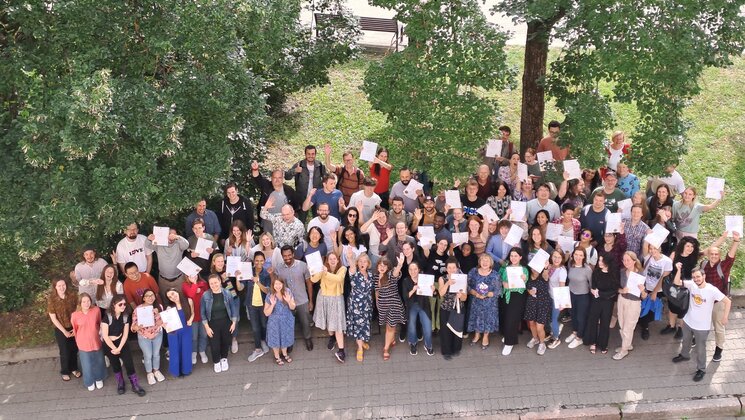-
Faculty of Arts and HumanitiesDean's Office, Faculty of Arts and HumanitiesJakobi 2, r 116-121 51005 Tartu linn, Tartu linn, Tartumaa EST0Institute of History and ArchaeologyJakobi 2 51005 Tartu linn, Tartu linn, Tartumaa EST0Institute of Estonian and General LinguisticsJakobi 2, IV korrus 51005 Tartu linn, Tartu linn, Tartumaa EST0Institute of Philosophy and SemioticsJakobi 2, III korrus, ruumid 302-337 51005 Tartu linn, Tartu linn, Tartumaa EST0Institute of Cultural ResearchÜlikooli 16 51003 Tartu linn, Tartu linn, Tartumaa EST0Institute of Foreign Languages and CulturesLossi 3 51003 Tartu linn, Tartu linn, Tartumaa EST0School of Theology and Religious StudiesÜlikooli 18 50090 Tartu linn, Tartu linn, Tartumaa EST0Viljandi Culture AcademyPosti 1 71004 Viljandi linn, Viljandimaa EST0Professors emeriti, Faculty of Arts and Humanities0Associate Professors emeriti, Faculty of Arts and Humanities0Faculty of Social SciencesDean's Office, Faculty of Social SciencesLossi 36 51003 Tartu linn, Tartu linn, Tartumaa EST0Institute of EducationJakobi 5 51005 Tartu linn, Tartu linn, Tartumaa EST0Johan Skytte Institute of Political StudiesLossi 36, ruum 301 51003 Tartu linn, Tartu linn, Tartumaa EST0School of Economics and Business AdministrationNarva mnt 18 51009 Tartu linn, Tartu linn, Tartumaa EST0Institute of PsychologyNäituse 2 50409 Tartu linn, Tartu linn, Tartumaa EST0School of LawNäituse 20 - 324 50409 Tartu linn, Tartu linn, Tartumaa EST0Institute of Social StudiesLossi 36 51003 Tartu linn, Tartu linn, Tartumaa EST0Narva CollegeRaekoja plats 2 20307 Narva linn, Ida-Virumaa EST0Pärnu CollegeRingi 35 80012 Pärnu linn, Pärnu linn, Pärnumaa EST0Professors emeriti, Faculty of Social Sciences0Associate Professors emeriti, Faculty of Social Sciences0Faculty of MedicineDean's Office, Faculty of MedicineRavila 19 50411 Tartu linn, Tartu linn, Tartumaa ESTInstitute of Biomedicine and Translational MedicineBiomeedikum, Ravila 19 50411 Tartu linn, Tartu linn, Tartumaa ESTInstitute of PharmacyNooruse 1 50411 Tartu linn, Tartu linn, Tartumaa ESTInstitute of DentistryL. Puusepa 1a 50406 Tartu linn, Tartu linn, Tartumaa ESTInstitute of Clinical MedicineL. Puusepa 8 50406 Tartu linn, Tartu linn, Tartumaa ESTInstitute of Family Medicine and Public HealthRavila 19 50411 Tartu linn, Tartu linn, Tartumaa ESTInstitute of Sport Sciences and PhysiotherapyUjula 4 51008 Tartu linn, Tartu linn, Tartumaa ESTProfessors emeriti, Faculty of Medicine0Associate Professors emeriti, Faculty of Medicine0Faculty of Science and TechnologyDean's Office, Faculty of Science and TechnologyVanemuise 46 - 208 51003 Tartu linn, Tartu linn, Tartumaa ESTInstitute of Computer ScienceNarva mnt 18 51009 Tartu linn, Tartu linn, Tartumaa ESTInstitute of GenomicsRiia 23b/2 51010 Tartu linn, Tartu linn, Tartumaa ESTEstonian Marine Institute0Institute of PhysicsInstitute of ChemistryRavila 14a 50411 Tartu linn, Tartu linn, Tartumaa EST0Institute of Mathematics and StatisticsNarva mnt 18 51009 Tartu linn, Tartu linn, Tartumaa EST0Institute of Molecular and Cell BiologyRiia 23, 23b - 134 51010 Tartu linn, Tartu linn, Tartumaa ESTTartu ObservatoryObservatooriumi 1 61602 Tõravere alevik, Nõo vald, Tartumaa EST0Institute of TechnologyNooruse 1 50411 Tartu linn, Tartu linn, Tartumaa ESTInstitute of Ecology and Earth SciencesJ. Liivi tn 2 50409 Tartu linn, Tartu linn, Tartumaa ESTProfessors emeriti, Faculty of Science and Technology0Associate Professors emeriti, Faculty of Science and Technology0Institute of BioengineeringArea of Academic SecretaryHuman Resources OfficeUppsala 6, Lossi 36 51003 Tartu linn, Tartu linn, Tartumaa EST0Area of Head of FinanceFinance Office0Area of Director of AdministrationInformation Technology Office0Administrative OfficeÜlikooli 17 (III korrus) 51005 Tartu linn, Tartu linn, Tartumaa EST0Estates Office0Marketing and Communication OfficeÜlikooli 18, ruumid 102, 104, 209, 210 50090 Tartu linn, Tartu linn, Tartumaa EST0Area of Vice Rector for ResearchUniversity of Tartu LibraryW. Struve 1 50091 Tartu linn, Tartu linn, Tartumaa EST0Grant OfficeArea of Vice Rector for DevelopmentCentre for Entrepreneurship and InnovationNarva mnt 18 51009 Tartu linn, Tartu linn, Tartumaa EST0University of Tartu Natural History Museum and Botanical GardenVanemuise 46 51003 Tartu linn, Tartu linn, Tartumaa EST0International Cooperation and Protocol Office0University of Tartu MuseumLossi 25 51003 Tartu linn, Tartu linn, Tartumaa EST0Area of RectorRector's Strategy OfficeInternal Audit OfficeArea of Vice Rector for Academic AffairsOffice of Academic Affairs0University of Tartu Youth AcademyUppsala 10 51003 Tartu linn, Tartu linn, Tartumaa EST0Student Union OfficeÜlikooli 18b 51005 Tartu linn, Tartu linn, Tartumaa EST0Centre for Learning and Teaching
Call for proposals for an international conference on the future of Canadian studies in Europe
Scholars from all disciplines are invited to submit proposals for the international multidisciplinary conference From Polarity to Circumpolarity: The Future of Canadian Studies in Europe, taking place at Stockholm University on 17–18 June 2026. The abstracts are due on 15 May 2025.
Dichotomies, dualisms, binaries have received considerable attention in scholarship over the past decades. Bruno Latour’s seminal work We Have Never Been Modern (1993) explores the origins of the dichotomy between nature and society and shows that the divide was never completely successful, as “hybrids” have been proliferating despite the modern philosophical stance. To further question a dualism that is deeply embedded in the intellectual tradition of the sciences and humanities, Donna Haraway coined the term “natureculture” (2003), which recognizes the inseparability of nature and culture in ecological relationships that are both biophysically and socially formed. Building on the philosophical implications of Niels Bohr’s work in physics, Karen Barad (2007) offers a new epistemological framework that calls into question the dualisms of object/subject, knower/known, nature/culture, and word/world. Their agential realist theory posits that discrete entities do not precede but come to be through intra-actions in phenomena produced by apparatuses, which are “material-discursive”: they produce determinate meanings and material beings while simultaneously excluding the production of others. Since everything is entangled with everything else means, it is the act of observation that makes a “cut” between what is included and excluded from what is being considered. Queer theory has also challenged binaries by questioning gender and heteronormative model that dominates our society. For example, Monique Wittig’s work has focused on gender difference and exposes heterosexual thought as a political regime that essentializes the sexual difference between men and women. A recent feminist reading of Roland Barthes’s concept of “neutral” (2023) has reminded how it is a valuable way to escape or undo the paradigmatic binary oppositions that structure and produce meaning in Western thought and discourse (Braunschweig 2021).
This multidisciplinary conference examines how the deconstruction of the dualisms that have dominated in Western thought since the 17th century takes shape in Canadian studies. Building on the Canadian landscape and scholarship on its nordicity (Chartier 2018), we hypothesize a move from polarity to circumpolarity in Canadian studies conducted in Europe. Canada has been built on numerous structural dichotomies: native/settler, French/English, North/South, white/colored, etc. Yet, as a country, it claims to overcome these dichotomies, notably through its multicultural policy. Canadian studies, like other area studies, have been established by distinguishing between Canada and the rest of the world, in a comparative and contrastive approach. Yet, thanks to the development of cultural studies in the past decades, they present a more nuanced perspective on this distinction. How do they go beyond binaries in their examination of Canada? Could the idea of the circumpolar fruitfully describe a movement that goes beyond the polarities of the modern thought in Canada? How do these polarities express themselves in Canada? How does the notion of circumpolarity contribute to deconstructing of an essentialist vision of the world? How does moving beyond dualisms present itself in the Canadian cultural production? How does it infuse discourses in/about Canada? How does the alternationbetween entanglement and distinction present itself in the Canadian context?
This multidisciplinary conference welcomes proposals from all fields of research, in the hope of bringing together complementary perspectives on the (circum)polarities in Canadian studies.
Works cited
- Barad, Karen. 2007. Meeting the Universe Halfway: Quantum Physics and the Entanglement of Matter and Meaning. Durham: Duke University Press.
- Barthes, Roland. 2023. Le Neutre: Cours au Collège de France (1978). Paris: Seuil.
- Braunschweig, Lila. 2021. Neutriser: Émancipation(s) par le neutre. Paris: Les liens qui libèrent.
- Chartier, Daniel. 2018. Qu’est-ce que l’imaginaire du Nord? Principes éthiques. Montréal: PUQ.
- Haraway, Donna J. 2003. The Companion Species Manifesto: Dogs, People, and Significant Otherness. Chicago: Prickly Paradigm Press.
- Latour, Bruno. 1991. Nous n'avons jamais été modernes: Essai d'anthropologie symétrique. Paris: La Découverte.
- Wittig, Monique. 2008. La pensée straight. Paris: Amsterdam [1992].
Submitting proposals
To submit a paper proposal, send an abstract of up to 1000 words (including the bibliography) with a bionote of approximately 100 words by 15 May 2025 to the following addresses: ccs@su.se and sara.bedard-goulet@ut.ee.
Notifications of acceptance will be sent out by 1 June 2025.
Please note that the conference cannot cover travel expenses but will be in hybrid format for those who cannot be on location.
From Polarity to Circumpolarity: The Future of Canadian Studies in Europe
Read more similar news






